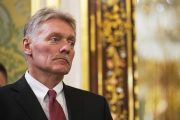Pope Francis issued an apostolic exhortation Evangelii Gaudium (The Joy of the Gospel) November 24 that explicitly condemned free market economics with an epithet against “trickle-down” economics, causing establishment socialists to gloat prolifically.
Evangelii Gaudium — largely about evangelization within the Catholic Church — touched on a sweeping variety of issues, including pastoral care, the mentality of evangelists, international immigration, why women can’t be priests, and many other issues. But the brief parts condemning the free market have caught the attention of the press.
Francis wrote, “Some people continue to defend trickle-down theories which assume that economic growth, encouraged by a free market, will inevitably succeed in bringing about greater justice and inclusiveness in the world. This opinion, which has never been confirmed by the facts, expresses a crude and naïve trust in the goodness of those wielding economic power and in the sacralized workings of the prevailing economic system.”
“Trickle down economics” has never been a term ever used by supporters of a free market to describe their views, but rather it has always been an insult deployed by opponents of free markets to ridicule their opponents. Thus, the pope’s letter received choruses of amens from the Washington Post’s leftist Eugene Robinson and huzzahs from the far-left ThinkProgress; and The Atlantic cheered the “Vatican’s journey from anti-communism to anti-capitalism.”
The “apostolic exhortation” (which is not an “infallible” ex cathedra pronouncement, and is even lower in authority than an encyclical letter) is a teaching document issued by a pope to address Catholics, but it doesn’t define any doctrines. As such, Catholics are not bound to accept the details of the letter. In practice, however, many Catholics will be persuaded they must do so by the mainstream media.
But was Pope Francis correct in his condemnation of a free market when he wrote that “we can no longer trust in the unseen forces and the invisible hand of the market”? The first question one must ask is “what unbridled free market is he talking about”? Most governments banished even vaguely pure free markets decades ago. In the United States, Americans enjoyed a largely free market until the 1930s, and a free market somewhat diminished after that, and enjoyed the greatest improvement in human living standards the world had ever witnessed. By way of contrast, controlled markets in most other countries remained mired in widespread poverty.
Those countries that have followed a relatively free market have been historically been rewarded with wealth and all of its attendant progress — better health care, living standards, etc. — in every country where it has been tried, and to the extent that it has been tried. All one has to do is to look at the contrast between the open market West Germany versus the socialist market East Germany, the open market South Korea versus the socialist North Korea, Hong Kong versus mainland China (before the most recent market-based reforms), and on and on.
Matt K. Lewis of the Daily Caller tried to put a pro-market spin on the papal letter, writing that “It is not inconsistent to believe that free markets provide prosperity for the most people — and that we face a daily struggle to resist greed and avarice. The prudent conservative has always acknowledged this inherent tension.” The papal letter goes far beyond merely voluntary giving, however, and presumes a far-reaching interference by government in the marketplace:
Growth in justice requires more than economic growth, while presupposing such growth: it requires decisions, programmes, mechanisms and processes specifically geared to a better distribution of income, the creation of sources of employment and an integral promotion of the poor which goes beyond a simple welfare mentality. I am far from proposing an irresponsible populism, but the economy can no longer turn to remedies that are a new poison, such as attempting to increase profits by reducing the work force and thereby adding to the ranks of the excluded.
Francis — the first Jesuit pope, and the first from the Western hemisphere — also quotes Benedict XVI’s 2009 Caritas in Veritate: “We need to be convinced that charity ‘is the principle not only of micro-relationships (with friends, with family members or within small groups) but also of macro-relationships (social, economic and political ones).’”
Pope Francis condemns materialism, the “new idolatry of money,” a condemnation all but the most extreme secular libertarians would second: “One cause of this situation is found in our relationship with money, since we calmly accept its dominion over ourselves and our societies. The current financial crisis can make us overlook the fact that it originated in a profound human crisis: the denial of the primacy of the human person! We have created new idols. The worship of the ancient golden calf (cf. Ex 32:1-35) has returned in a new and ruthless guise in the idolatry of money and the dictatorship of an impersonal economy lacking a truly human purpose. The worldwide crisis affecting finance and the economy lays bare their imbalances and, above all, their lack of real concern for human beings; man is reduced to one of his needs alone: consumption.”
Capitalism — to the extent it is truly based on market forces — is as much about service and providing needs as it is about consumption. Businesses work to provide needed goods and services to people, competing to give them necessities such as food, housing, and transportation — at the lowest price. One could argue that leading up to the financial crisis (and since), government has heavily favored the financial sector (favorable regulations, suppression of interest rates, no personal financial liability for well-paid executives who bankrupt their companies, and taxpayer bailouts) which doesn’t actually produce any product. And government has unfairly favored other industries with political connections: auto-industry bailouts, no-bid contracts on the ObamaCare website, defense contracts that can only be called “crony capitalism,” copyright favoritism, and millions in subsidies to green energy companies.
But this government interference led to the greater suffering and and economic recessions, not the free market.
Moreover, Francis clearly did not call for socialism, noting that “Business is a vocation, and a noble vocation, provided that those engaged in it see themselves challenged by a greater meaning in life; this will enable them truly to serve the common good by striving to increase the goods of this world and to make them more accessible to all.”
Most shocking for some was Pope Francis’ brief quote of St. John Chrysostom in Evangelii Gaudium, where he seems to favor abolishing legal rights in property: “Ethics — a non-ideological ethics — would make it possible to bring about balance and a more humane social order. With this in mind, I encourage financial experts and political leaders to ponder the words of one of the sages of antiquity: ‘Not to share one’s wealth with the poor is to steal from them and to take away their livelihood. It is not our own goods which we hold, but theirs.’”
Again, Francis does not go so far as to call for abolition of private property, a principle enshrined in two of the 10 Commandments and in non-binding Catholic tradition as well. “The private ownership of goods is justified by the need to protect and increase them, so that they can better serve the common good.”
St. John Chrysostom’s second sermon on Lazarus, quoted by Francis in Evangelii Gaudium, talks about regarding property as an opportunity to serve others as ourselves instead of through some politically communistic egalitarianism. Chrysostom wrote about viewing wealth of this world in a different way: “The rich man is not the one who has collected many possessions but the one who needs few possessions; and the poor man is not the one who has no possessions but the one who has many desires.” Chrysostom wrote:
For just as on the stage actors enter with the masks of kings, generals, doctors, teachers, professors, and soldiers, without themselves being anything of the sort, so in the present life poverty and wealth are only masks. If you are sitting in the theater and see one of the actors wearing the mask of a king, you do not call him fortunate or think that he is a king, nor would you wish to become what he is…. In the same way even here, sitting in this world as if in a theater and looking at the players on the state, when you see many rich people, do not think they are truly rich, but that they are wearing the masks of rich people.
John Chrysostom didn’t rail against “inequality,” but he wrote about a moral obligation on those who are wealthy. Indeed, the Papacy itself is an example of great wealth entrusted to men on Earth. While the Vatican’s wealth is sometimes exaggerated by the Catholic Church’s detractors, the Pope commands billions of dollars and many of the world’s luxuries: gold, paintings, land holdings, and some of the finest luxuries on the planet. Few would say that the Vatican should sell off its historic paintings and real estate and give it all to the poor tomorrow. As such, Chrysostom’s remarks may be said to be analogous to the French term noblesse oblige, which has been roughly ranslated to mean “to whom much is entrusted, much will be required.”
It’s difficult to predict what impact this papal pronouncement will have, especially without a specific government action agenda laid out. The Catholic church’s doctrine — as embodied in Scripture and its dogmatic tradition (21 ecumenical councils and less than a handful of “infallible” papal ex cathedra pronouncements) — claims its teaching is binding on faithful Catholics in matters of faith and morals, but it makes no claims on expertise in how to apply those principles to sciences and other technical matters. So in the sense that the pope avoided laying out a detailed political prescription for global poverty, Pope Francis recognized the limitations of the expertise of his station within the Catholic tradition.




